
Price based on lowest available cruise only fare for double occupancy. Subject to change at any time.
Designed for polar exploration, Silver Endeavour is the new definition of luxury expedition travel.
We're proud to announce that our newest addition has joined the fleet. Silver Endeavour revolutionises our expedition voyages and allows deeper travel to some of the planet's farthest-flung coasts. Her statistics speak for themselves: unrivalled, industry-leading crew-to-guest, zodiac-to-guest, and expert-to-guest ratios, cutting-edge navigation and exploration technology, and hallmark Silversea comfort make her the most luxurious expedition ship ever built.
Sailing to both poles, our newest ship redefines the meaning of ultra-luxury expedition cruising. Her PC6 ice-class rating is one of the highest in the industry, while her state-of-the-art equipment and exploration technology offer one of the most advanced expedition experiences ever. Silver Endeavour introduces a new era in ultra-luxury expedition cruising, and brings the remote and remarkable to you in hallmark Silversea comfort. Join us for endless possibilities both onboard and on land aboard Silver Endeavour, the most luxurious expedition ship at sea.
Spread over eight public decks, Silver Endeavour features ample onboard space, multiple restaurants, and a huge choice of bars and lounges. Additionally, her large and luxurious suites are some of the best in expedition cruising. Superbly designed, all her suites feature a balcony and an impressive crew-to-guest ratio of 1:1.
Cruise ID: 28032
Setting sail on Silversea promises peace of mind from start to finish. That means no worrying about tipping the butlers or staff. Our crew-to-guest ratio of almost 1:1 ensures flawless service from pole to pole, but with us, you never have to think about who should get a tip, how much you should give and when. It's all included! We believe that not having to deal with tipping helps make your luxury cruise even more special and stress-free. And that is worth every penny.
| Date | Time | Price * | Booking |
|---|---|---|---|
| 08 August 2024 | 20:00 | €18,434 | Call us to book |
* Price based on lowest available cruise only fare for double occupancy. Subject to change at any time.
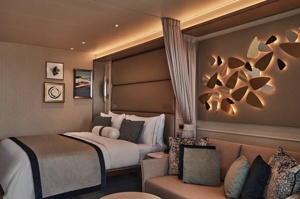
Deluxe Veranda Suites keep the iconic suite configuration - one of the most successful in the industry - while enhancing your creature comforts and destination immersion. Located on the privileged upper mid levels, Deluxe Veranda Suites have spacious interiors with a bedroom area that includes a large writing desk and comfortable living room with a convertible sofa (able to accommodate a third berth). Even better, the balcony is larger and more beautiful than ever, offering ample space to relax and enjoy sweeping views, wherever you are.
One bedroom: 33.1 sq.m. including veranda
Please note that the 3rd guest will sleep on a comfortable sofa bed in the reception area of the suite.
Images are intended as a general reference. Features, materials, finishes and layout may be different than shown.
Essentials
Characteristics
Furniture
Media & Communication
Onboard Services
Amenities
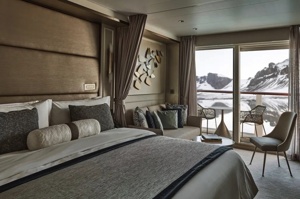
The Superior Veranda Suite is found on the upper decks. From the sumptuous views from the teak veranda to the spacious sitting room (with sofa bed able to accommodate a third berth) and large marble bathroom, everything about the Superior Veranda has been designed for your comfort. A comfortable living space, attention to detail and a generous expanse of amenities makes this stunning suite a cosy home while on the seas.
One bedroom: 33.1 sq.m. including veranda
Please note that the 3rd guest will sleep on a comfortable sofa bed in the reception area of the suite.
Images are intended as a general reference. Features, materials, finishes and layout may be different than shown.
Essentials
Characteristics
Furniture
Media & Communication
Onboard Services
Amenities
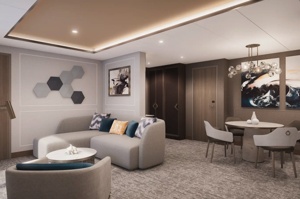
Get closer to your destination with Silver Endeavour's Signature Suite! Located on deck eight, this beautiful accommodation offers a wonderfully large living room, a dining area, a separate bedroom and a bathroom with walk-in shower and whirlpool bath. But surely the best thing about the Signature Suite is the huge private veranda and floor-to-ceiling glass walls, offering you sweeping views whether you are at the tip or toe of the world. The Signature Suite is one of our favourite places to melt into enjoy serene polar landscapes after a day of on shore exploring.
One bedroom: 67-78 sq.m. including veranda
Images are intended as a general reference. Features, materials, finishes and layout may be different than shown.
Essentials
Characteristics
Furniture
Onboard Services
Amenities
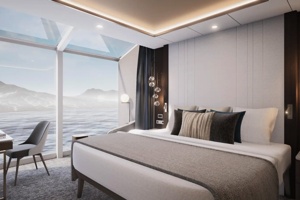
One of our most sumptuous suites ever designed! With innovative domed glazing surrounding the living areas and one of the largest balconies on board, the Master Suite offers complete destination immersion at sea. Floor-to-ceiling windows provide wow-factor 270° views, while the beautifully appointed living and dining areas, separate bedroom and bathroom with walk in shower and whirlpool bath ensure complete in suite comfort. If you have ever wanted to experience expedition travel while not missing on luxury, Silver Endeavour's Master Suite is the answer.
One bedroom: 108 sq.m. including veranda
Images are intended as a general reference. Features, materials, finishes and layout may be different than shown.
Essentials
Characteristics
Furniture
Media & Communication
Onboard Services
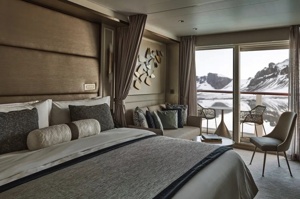
Located lower bow, the Classic Veranda Suite offers all the comfort and attention to detail that you can expect aboard — both inside and out. A generous expanse of interior comforts — elegant décor, stunning marble bathroom and ample seating area (with sofa bed that is able to accommodate a third berth), offers everything you need for a comfortable cruise. But perhaps this suite's finest asset lies just outside, as floor-to-ceiling glass doors open onto a private veranda, making every sunset feel as if it is yours alone.
One bedroom: 33.1 sq.m. including veranda
Wheelchair accessible suite has a bathroom with vanity and shower.
Please note that the 3rd guest will sleep on a comfortable sofa bed in the reception area of the suite.
Images are intended as a general reference. Features, materials, finishes and layout may be different than shown.
Essentials
Characteristics
Furniture
Media & Communication
Onboard Services
Amenities
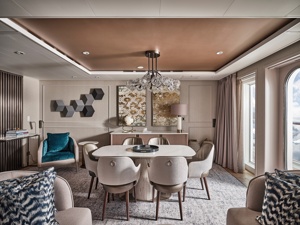
Supremely spacious and superbly located, the Owner's Suite is the most luxurious suite on board. Located in the premium bow position on deck seven, the Owner's Suite offers amazing destination immersion, thanks its enormous surrounding balcony and incredible views from all indoor areas. The large living room, separate dining area and well-stocked bar are perfect for sharing a moment with like-minded travellers, while the luxurious and well-appointed bedrooms ensure supreme comfort any time of the day or night.
One bedroom: 173.5 sq.m. including veranda
Main bedroom has a large walk-in wardrobe with personal safe and a bathroom with double vanity, walk-in shower and whirlpool bath.
Second bedroom has a separate wardrobe and a bathroom with walk-in shower.
Images are intended as a general reference. Features, materials, finishes and layout may be different than shown.
Essentials
Characteristics
Furniture
Media & Communication
Onboard Services
Amenities
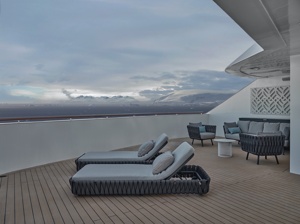
The Grand Suite is one of the most luxurious and spacious suites on board Silver Endeavour. It guarantees sweeping views of your destination thanks to its large balcony. A spacious interior includes a large living room, separate dining area and large bedroom with a big walk-in wardrobe. A luxurious bathroom with double vanity, whirlpool bath and walk-in shower completes. In addition, the Grand Suite also includes a small, second bedroom able to accommodate a third berth.
One bedroom: 155 sq.m. including veranda
Two bedroom: 188.1 sq.m. including veranda
Third guest can be accommodated in an additional single bed bedroom.
Images are intended as a general reference. Features, materials, finishes and layout may be different than shown.
Essentials
Characteristics
Furniture
Media & Communication
Onboard Services
Amenities

No Silversea ship would be complete without our guests' favourite Silver Suite. Located on deck eight, the Silver Suite promises stunning views of the destination thanks to its floor-to-ceiling window and large balcony. The spacious living area allows for comfortable relaxing while the dining area makes cosy nights in veritable experiences in themselves. Additionally, Silver Suites feature generous walk-in wardrobes as well as a bathroom with a large walk-in shower, vanity and separate lavatory.
One bedroom: 49.7 sq.m. including veranda
Please note that the 3rd guest will sleep on a comfortable sofa bed in the reception area of the suite.
Images are intended as a general reference. Features, materials, finishes and layout may be different than shown.
Essentials
Characteristics
Furniture
Media & Communication
Onboard Services
Amenities
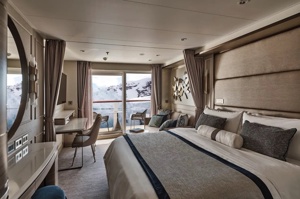
Our best-selling Premium Veranda Suite is more beautiful and luxurious than ever on board Silver Endeavour. This suite offers a large bedroom space with dreamy bedding, a stunning marbled bathroom with a large vanity and sumptuous walk-in shower. Comfortable furnishings and elegant decor make staying in (almost) as good as going out! Spacious and well-situated, enjoy ultra-luxury amenities from the 24-hour butler service to the well-stocked mini-bar (and yes, they're all included!). The sofa-bed can easily accommodate a third guest.
One bedroom: 33.1 sq.m. including veranda
Please note that the 3rd guest will sleep on a comfortable sofa bed in the reception area of the suite.
Images are intended as a general reference. Features, materials, finishes and layout may be different than shown.
Essentials
Characteristics
Furniture
Media & Communication
Onboard Services
Amenities
Day 1 Pond Inlet, Nunavut, Canada
Located in northern Baffin Island, Pond Inlet is a small, predo¬minantly Inuit community, with a population of roughly 1,500 inhabitants. In 1818, the British explorer John Ross named a bay in the vicinity after the English astronomer John Pond. Today Pond Inlet is considered one of Canada's "jewels of the North" thanks to several picturesque glaciers and mountain ranges nearby. Many archaeological sites of ancient Dorset and Thule peoples can be found near Pond Inlet. The Inuit hunted caribou, ringed and harp seals, fish, polar bears, walrus, narwhals, geese, ptarmigans and Arctic hares, long before European and American whalers came here to harvest bowhead whales. Pond Inlet is also known as a major center of Inuit art, especially the printmaking and stone carving that are featured in the town's art galleries.
Day 2 Bylot Island, Nunavut, Canada
Bylot Island, off the northern end of Baffin Island has an area of 4,273 square miles, making it one of the largest uninhabited islands in the world. Cape Burney lies on the east coast of Bylot Island, and is used regularly by local Inuit during their hunting and fishing seasons. The island is named for the Arctic explorer Robert Bylot who was the first European to sight the island's steep mountains, ice fields, sheer cliffs, snowfields and glaciers in 1616. A total of 74 species of Arctic birds thrive on this island. In fact, it is such an important nesting area that the entire island has been incorporated into the Sirmilik National Park, and the eastern part of the island is federally designated as the Bylot Island Migratory Bird Sanctuary. It is also a major nesting site for birds, including Thick-billed Murres, Black-legged Kittiwakes and Greater Snow Geese.
Day 3 Beechey Island, Nunavut, Canada
Beechey Island is a small island off the southwest coast of Devon Island, separated by a narrow waterway called the Barrow Strait. Captain William Edward Parry was the first European to visit the island in 1819. His lieutenant, Frederick William Beechey, named the island after his father, the artist William Beechey (1753–1839). Beechey Island played a significant role in the history of Arctic Exploration. During the winter of 1845-46, Sir John Franklin and his men camped on the island as part of their ill-fated quest to find the Northwest Passage. Mummified remains of three of Franklin's crew were discovered, giving a better understanding of what happened before the disappearance of the expedition. In 1850 Edward Belcher used the island as a base while surveying the area. Later, in 1903, Norwegian explorer Roald Amundsen stopped at the island at the beginning of his successful voyage in search for the Northwest Passage. Subsequently, Beechey Island has been declared a "Territorial Historic Site" since 1975 by the Northwest Territories government
Day 4 Cruising
Day 5 Prince Leopold Island, Nunavut, Canada
Day 6 Radstock Bay, Devon Island, Canada
Devon Island is Canada's sixth largest island and was first seen by Europeans in the early 17th century. The Thule culture had already settled there many centuries before, and left behind qarmat homes, made of rocks, whale bones, rock and sod walls, and skins for roofs that tell a story of over 800 years of human habitation. Other striking finds in this area are the many fossils of corals, crinoids and nautiloids that can be seen. Just across Lancaster Sound is Prince Leopold Island, a Canadian Important Bird Area, a federally listed migratory bird sanctuary, and a Key Migratory Bird Terrestrial Habitat site with large numbers of Thick-billed Murres, Northern Fulmars and Black-legged Kittiwakes that breed there.
Day 7 Dundas Harbour, Devon Island, Nunavut, Canada
Dundas Harbour is located in the southeast of Devon Island, Canada's 6th largest island. It is a forlorn but starkly beautiful spot. The island was first sighted by Europeans in 1616 by the English explorers Robert Bylot and William Baffin. But it did not appear on maps until after explorer William Edward Parry's exploration in the 1820's. Parry named it after Devon, England. In the local Inuktitut language, the place is called Talluruti, which translates as “a woman's chin with tattoos on it.” This refers to the deep crevasses and streaks on Devon Island, which from a distance resemble traditional facial tattoos. On land there are remains of a Thule settlement dating back to 1000 A.D., including tent rings, middens and a gravesite. There are also much more recent remains a Royal Canadian Mounted Police outpost. The first post was established in 1924 to monitor and control illegal activities, such as foreign whaling, in the eastern entrance to the Northwest Passage. But conditions were so isolated and severe that the post was abandoned in 1933. It was reopened in 1945, but again closed, this time permanently, in 1951. Today, Devon Island is the largest uninhabited island in the world.
Day 8 Grise Fjord, Canada
Grise Fiord is an Inuit hamlet on the southern tip of Ellesmere Island, in the Qikiqtaaluk Region, Nunavut, Canada. It is one of three populated places on the island; despite its low population, it is the largest community on Ellesmere Island.
Day 9 Qaanaaq, Greenland
In AD 850, the Vikings established their parliament in Tórshavn, a name which translates as "Thor's harbor." It was named after Thor, the god of thunder and lightning in Norse mythology. The town became a center of trade for the island, and in fact was designated as the only legal place for the islanders to sell and buy products. This trade monopoly was abolished in 1856. Today it is the capital and largest city of the Faroe Islands, with fish-processing plants, a shipyard, and woolen products making up. It is considered to be one of the oldest capitals in Northern Europe.
Day 10 Cape York, Greenland
Visit the arctic seascape of Cape York, Greenland. Located on the northwestern coast of Greenland in Baffin Bay, Cape York is an important geographical feature delimiting the Melville Bay at its northwestern end and Kiatassuaq Island at its other end. There is a chain of coastal islands that stretches between the two capes, most notably Meteorite Island, named for the discovery one of the world's largest iron meteorites in Savissivik, a settlement on the island. The iron from this meteorite attracted Inuit migrating from Arctic Canada who used the metal in making tools and harpoons. Visitors to this region will see iconic drifting blue-white icebergs that are shrinking as the earth temperature rises.
Day 11 Pond Inlet, Nunavut, Canada
Located in northern Baffin Island, Pond Inlet is a small, predo¬minantly Inuit community, with a population of roughly 1,500 inhabitants. In 1818, the British explorer John Ross named a bay in the vicinity after the English astronomer John Pond. Today Pond Inlet is considered one of Canada's "jewels of the North" thanks to several picturesque glaciers and mountain ranges nearby. Many archaeological sites of ancient Dorset and Thule peoples can be found near Pond Inlet. The Inuit hunted caribou, ringed and harp seals, fish, polar bears, walrus, narwhals, geese, ptarmigans and Arctic hares, long before European and American whalers came here to harvest bowhead whales. Pond Inlet is also known as a major center of Inuit art, especially the printmaking and stone carving that are featured in the town's art galleries.
The Department of Foreign Affairs has up-to-date advice for Irish citizens on staying safe and healthy abroad. For more security, local laws, health, passport and visa information see https://www.dfa.ie/travel/travel-advice/ and follow dfatravelwise